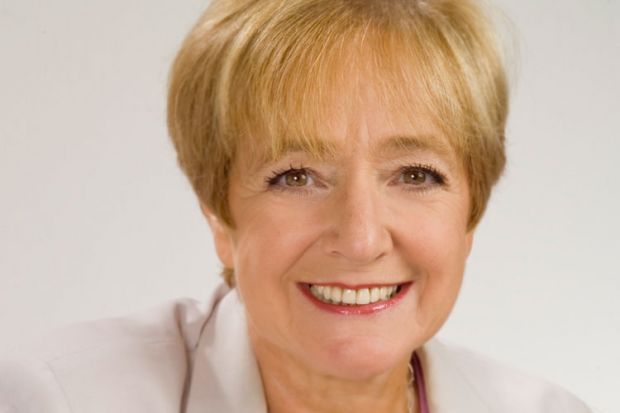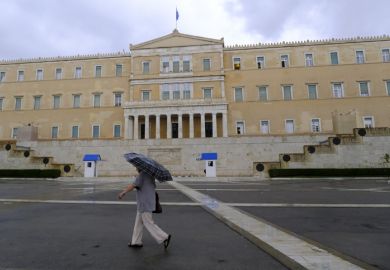The Public Accounts Committee today publishes a damning report highlighting a catalogue of errors by the Department for Business, Innovation and Skills, following a December hearing on the department’s lack of controls over public funding at private providers.
The report says that Martin Donnelly, the BIS permanent secretary, could have sought a “ministerial direction” – a written order requested by civil servants when they disagree with a decision – when confronted with the policy to expand private provision. But he did not do so and “must bear responsibility”, the report says.
The government “ignored repeated warnings about the potential waste and abuse of public money” caused by an expansion in support for students at private providers, according to Margaret Hodge, the Labour MP who chairs the committee. She said BIS had been “explicitly warned” by the Higher Education Funding Council for England and the University and College Union, but went ahead.
She added that BIS “pressed ahead with the expansion of the alternative provider sector without sufficient regulation in place to protect public money. In our view, the risks associated with proceeding without the necessary legislative powers were sufficiently great that the accounting officer [Mr Donnelly] ought to have sought a ministerial direction.”
According to the report, BIS failed to identify and act quickly on known risks associated with the process; did not protect the interests of legitimate students, the taxpayer, or alternative providers who are performing well; and does not know how much public money has been wasted during the expansion.
“As a result of its lax approach, [BIS] allowed £3.84 million of public money to be given to ineligible EU students in the form of student loans and grants, where EU students had either chosen not to or had been unable to prove that they met eligibility criteria on residency,” Ms Hodge said,
“Furthermore, it has been unable to quantify how much money has been lost when it has funded students who have failed to attend, or failed to complete courses, or were not proficient in the English language, or were not entered for qualifications, or where courses themselves were poorly taught.”
About 140 UK institutions are considered to be “alternative providers” accessing public funding through Student Loans Company money. The report says there has been “a substantial and rapid growth in the sector”, and the number of students claiming support for courses at alternative providers rose from 7,000 to 53,000 between 2010 and 2014.
The committee’s report says that if “risks to public money cannot be sufficiently controlled, whether through legislative or other means, they should seek a ministerial direction”.
The report notes that without a higher education bill – which the coalition government had planned but was forced to drop – there was no legislation to establish new regulation for private providers.
BIS, the report adds, “continued with implementation but failed to think through how it would manage the risks in the absence of the expected legislative powers…In these circumstances, the accounting officer at the department [Mr Donnelly] could have sought a ministerial direction to proceed, but did not, so must bear responsibility.”
The department also failed to learn from previous government experience, the report concludes, in particular the introduction of Individual Learning Accounts, which collapsed in 2001 amid allegations of fraud among learning providers.
It adds that BIS should “provide us with a clear explanation of how it will manage these risks in future”, including the warning from the National Audit Office about high dropout rates at some alternative providers.
Other criticisms included claims that some private providers admitted students with unacceptably low fluency in English and at increased risk of failing or dropping out, and that BIS failed to define any measures to track its objective of improving student choice by supporting a more diverse sector.
BIS should “report back to us urgently” with an assessment of how much public money is at risk of being wasted, the report concludes.
Sally Hunt, the UCU general secretary, said: “Members of the Public Accounts Committee were as shocked as we were over the government’s refusal to heed our warnings about private providers’ access to taxpayers’ money.
“The government still has serious questions to answer about why it ignored these repeated warnings and why it allowed such rapid expansion to go unchecked.”
Aldwyn Cooper, vice-chancellor of Regent’s University London and chair of the Independent Universities Group, said members of that group have “undergone stringent quality reviews in order to gain their own degree-awarding powers and provide excellent student outcomes”.
He added: “Poor quality should not be tolerated. It drains the public purse and risks tarnishing the UK higher education brand.”
A BIS spokesman said: “Alternative providers play a significant role in widening access to higher education for British and foreign students, as well as boosting our exports.
“Our priority is to protect the interest of students and safeguard taxpayers’ money. We have made continuous improvements to the management of alternative providers since 2012.
“We recently introduced reforms to drive up quality, aimed at the small number of providers who are not currently meeting our high standards. These include a fit and proper persons test for directors and a requirement to register students for the course before they can access funding.
“We are also shortly consulting on how to ensure that all students on funded courses have the right English language skills to achieve their qualifications.”
Birth pains: Times Higher Education’s coverage of ‘alternative’ providers
As universities minister, David Willetts memorably predicted that “letting new providers into the system” would be “the rising tide that lifts all boats”.
Since that statement, at a Universities UK conference in 2011, THE has reported on a long list of difficulties associated with the increasing role of private, and in particular for-profit, providers.
- Our reporting of the role played by private providers in UK higher education started long before Mr Willetts’ speech at the UUK conference, and included a detailed analysis in 2010 following the decision to award for-profit BPP with university college status.
- In 2011, we reported on the unusual focus of some of the colleges being designated for access to Student Loans Company funding, including Norland College, which trains “Norland nannies” and has been described as “the world’s most upper-crust nursery training school”.
- Also in 2011, we revealed that private colleges providing degrees in subjects ranging from law and finance to bible studies and acupuncture had received more than £25 million via taxpayer-subsidised student loans since top-up fees were introduced.
- The following year, in 2012, we reported on the Quality Assurance Agency’s admission that it had no knowledge of the teaching quality at two-thirds of the private institutions benefiting from state-backed loans funding.
- This was followed by the revelation that students on private college courses such as animal chiropractic care and “contemporary person-centred psychotherapy” had been eligible to receive state-subsidised funding for the past two years, with one private institution being given state loan access for nearly 100 sub-degree vocational courses in a single day.
- In 2014, we reported on SLC data showing that two for-profit colleges, GSM London and St Patrick’s International College, received more mainstream public funding for their teaching than the London School of Economics as part of a state-backed bill for private higher education that had reached £0 million.
- In another exclusive in 2014, we reported that the for-profit college with the fastest growth in income from taxpayer-funded students was owned by a holding company in the Netherlands, a structure that some companies have used for tax advantages.
- And in October, we ran an in-depth investigation into one private London institution, Regent College, as a case study to explore the way that the government’s reforms were being used on the ground.
Register to continue
Why register?
- Registration is free and only takes a moment
- Once registered, you can read 3 articles a month
- Sign up for our newsletter
Subscribe
Or subscribe for unlimited access to:
- Unlimited access to news, views, insights & reviews
- Digital editions
- Digital access to THE’s university and college rankings analysis
Already registered or a current subscriber? Login




